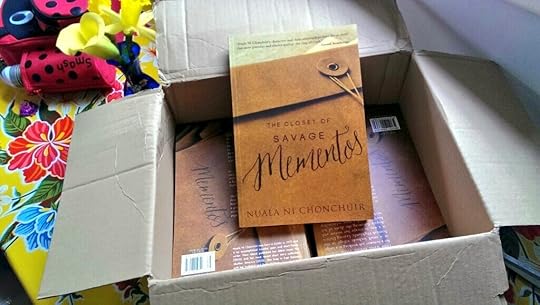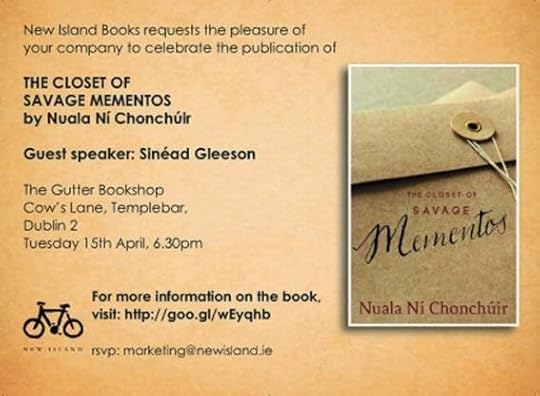Nuala Ní Chonchúir's Blog, page 37
April 10, 2014
NEW FLASH AT DWF BLOG & BRIDPORT FLASH COMP
I've a new flash up at the Dublin Writers' Festival blog, called 'Joyriders'. The festival will be launched tonight at 6pm in The Liquor Rooms on Wellington Quay.
Speaking of flash fiction, The Bridport Flash Prize is judged this year by my friend Tania Hershman. 250 words - £1000 first prize!
Speaking of flash fiction, The Bridport Flash Prize is judged this year by my friend Tania Hershman. 250 words - £1000 first prize!
Published on April 10, 2014 01:40
April 9, 2014
BOX OF BOOKS DAY!
Published on April 09, 2014 05:28
April 8, 2014
Gregory O'Donoghue Prize poems published
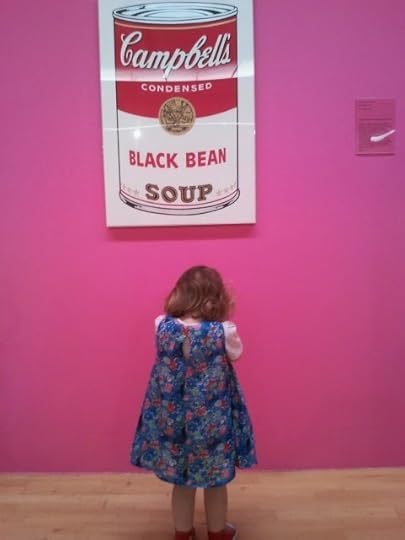 Juno refusing to look at Warhol - Tate, Liverpool - 2012The winning and shortlisted poems for the Gregory O'Donoghue Prize have been published now in
Southword
. Read winner Maya Popa's 'Hummingbird' to see the type of poem that wins an international prize such as this.
Juno refusing to look at Warhol - Tate, Liverpool - 2012The winning and shortlisted poems for the Gregory O'Donoghue Prize have been published now in
Southword
. Read winner Maya Popa's 'Hummingbird' to see the type of poem that wins an international prize such as this.Judge Patrick Cotter has written a judge's summation on his blog about the thirteen poems. He has this to say about my shortlisted poem 'Juno Refuses to Look at Warhol': Nuala Ní Chonchúir’s ‘Juno Refuses to Look at Warhol’ builds up to the poetic insight often revealed through the fresh perspective of a child’s eye. Derek Mahon composed a two liner based on his infant daughter’s observation of sunlight reflected on a ceiling. Here Ní Chonchúir spins a charming narrative.
Published on April 08, 2014 09:17
April 6, 2014
New story in Uimhir a Cúig/Numéro Cinq - Canada
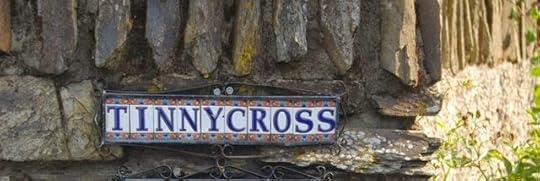
I have a new story in this month's Uimhir a Cúig , which is an Irish corner of Canadian lit mag Numéro Cinq, edited by Gerard Beirne. The story is called 'Tinnycross' and the editor says of it: 'Ní Chonchúir uses language like a plow, turning over the upper layer of the brothers’ hardened relationship to bring to the surface the roots of abandonment in the hopes of cultivating some form of reclamation. A cruelty borne out of rectitude, decency even.'
In this issue there is also a review of Lorrie Morre's collection Bark by Richard Farrell: '[Bark] is a wise meditation on the human struggle for affection, for identity, and for meaning. Less transcendent than Whitman’s barbaric yawp, more restrained than Ginsburg’s howl, Moore’s bark sounds a weary note.'
In a previous issue, Farrell interviewed writer Steven Heighton whose writing (and person-ness) I fell for at the Cork Short Story Festival last year. I highly recommend Heighton's Workbook: Memos and Dispatches on Writing to all writers. Farrell says: 'At times, and especially in Workbook, it feels as if Heighton is lowering a rope ladder down from the Elysian fields and inviting others up.' Yup.
Published on April 06, 2014 12:37
April 2, 2014
Mindshift Meet-Up at the IWC - published writers
Mindshift Meet-Ups at the IWC are specifically for published writers and are open to any writer with at least one publication. The next one is on Saturday April 12th from 1:30-3pm.Topic: The relationship with a) agents and b) publishers. Discussion will be kicked off by Mia Gallagher.I normally attend but, sadly, Cúirt is on that weekend in Galway so I can't. But I recommend these meetings to all - they are very fruitful and you'll meet lovely people.
Published on April 02, 2014 09:00
April 1, 2014
EMMA DONOGHUE AT THE DWF PREVIEW EVENT

My review for the DWF blog - for which I now write - of Emma Donoghue's event in Dublin Castle last Saturday is here. Her advice to wannabe writers: ‘Take it up at 70 or 12. You only need yourself. Go ahead and do it. Don’t let any paralysing self-consciousness get in your way. Plunge in and have a go.’ Lovely Emma D.
Published on April 01, 2014 02:00
March 31, 2014
INVITE TO MY NOVEL LAUNCH - DUBLIN
Published on March 31, 2014 23:00
DAN POWELL INTERVIEW & BOOK GIVEAWAY

Readers of this blog are familiar with the lovely Dan Powell, writer and stay-at-home Dad. I interviewed him here back in 2012. I am beyond delighted to welcome Dan back today on his blog tour to celebrate the publication of his début short fiction collection, Looking Out Of Broken Windows, which was shortlisted for the Scott Prize in 2013 and is published by Salt. Dan is a prize winning author whose short fiction has appeared in Carve, Paraxis, Fleeting and The Best British Short Stories 2012. He blogs at danpowellfiction.com and he's on Twitter as @danpowfiction.
Check out Dan's impressive book trailer, above, where artist friends of his provided a glimpse of what the stories in the book might look like as comics.
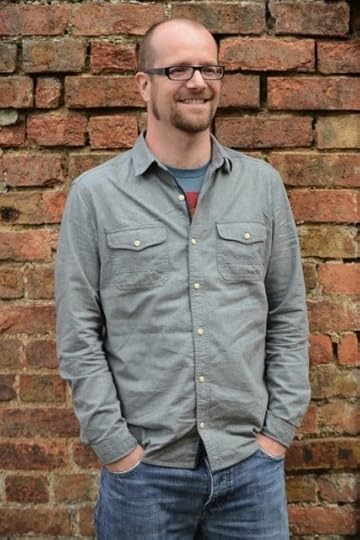 Writer Dan PowellNuala: Welcome, Dan. Tell us about Looking Out of Broken Windows– its concerns, its themes. To my mind the book is partially concerned with how regular suburban life can be extraordinary. What are your thoughts on that?
Writer Dan PowellNuala: Welcome, Dan. Tell us about Looking Out of Broken Windows– its concerns, its themes. To my mind the book is partially concerned with how regular suburban life can be extraordinary. What are your thoughts on that?Dan: These stories are definitely dealing with how the mundane, everyday experience is in fact spectacular. This idea is threaded through the stories but it wasn't something I consciously set out to do. The stories were written over a five year period and each one (with the exception of the three Ultrasound fictions) were written in isolation. When I began to assemble the collection it soon became clear that this idea, of the intensity that sits inside seemingly mundane suburban family life, was something that had been finding its way into many of the stories I was selecting. Looking at them now, in the context of the collection, it seems that I was dealing with the things that go unsaid in those family relationships: the secrets, the lies, the things we let go of and later regret, the spectacular things that happen in life that we take for granted. I suppose that's why so many of the stories, while realist in tone, trip into magical realism at some point. I was trying to bring out those things, show them more starkly against the background of the everyday. I was thrilled when the cover blurb you provided for the book picked up on that aspect of the collection.
N: Your stories often have touches of the surreal. What is the appeal of that to you? Are there writers in that vein that you admire?
D: These surreal or magical realist elements are a way of writing the interior lives of the characters into the foreground of a story without explicitly showing the reader what is happening. It is as the characters interact with these elements that the real emotional arc of the story becomes apparent. So in 'Storm in a Teacup' for example, the storm becomes a crisis in the cafe that actually represents the internal crises of all the characters witnessing the event. The fantasy element becomes a mirror in which the characters can see themselves and, hopefully, one in which the reader will perhaps see something of his or herself.As for writers I admire in this vein, obviously there is Kafka, but also Chekhov. Many of Anton Chekhov's early short stories have surrealist elements, a fact often ignored in light of his later, classic stories. His story The Exclamation Mark, in which a clerk begins arguing with punctuation, is a favourite of mine. More contemporary authors who have influenced this aspect of my writing would be Aimee Bender, Etgar Keret, and Michel Faber, who's short stories bridge gaps between so many genres.
N: Tell us about the putting together of Looking Out of Broken Windows– what was your approach to fitting the stories together as a book?
D: On the most basic level putting the collection together was simply a matter of selecting the best stories I had written in the last five years or so since I began seriously writing. From a total pool of about seventy or so short and flash fictions, I trimmed things down to just over thirty that I thought might work together. On reading them through again, some for the first time since they had been published in anthologies or journals, the theme of characters looking out at the world through the broken lense of their perspective seemed to be peeking out from almost all of them. All of the twenty-seven stories that ended up in the book have a main character who is struggling to deal with a world that seems to them broken in some way. As the stories progress some characters manage to discover that the fracture is actually in them, some remain trapped in their skewed viewpoint. A few of the stories that failed to make the cut for this collection have been earmarked for the next, the rest will slowly settle to the bottom of my laptop's filing system. Once I had the stories, I ordered them using a system I nicked from the brilliant Carys Bray. I wrote each title down on a post-it with notes on the characters, themes, point-of-view and tone of each story. Then I stuck the post-its on a cupboard door and, while editing the stories again, I shuffled the stories round on the door until, after a couple of weeks of thinking about them in this way, I had the running order you see in the book. That said, they can and should be read in any order. All the stories were written independently and are more than able to stand on their own two feet.
N: One story in the book is called ‘What We Don’t Talk about When We Talk about Cancer’, which is a riff on Ray Carver. Do titles come easily to you? Is it a fun part of the process for you?
D: I struggle with titles. As the first thing readers will see of the story. They are key and often, unless it is one of the few stories I have written which spawned from a title phrase, 'Storm in a Teacup' for example, I have no clue what to call something. Part of the fun of writing these 'as yet untitled stories' is working out what they will be called. Late in the writing process, on the penultimate or final draft a title will present itself and I know it is right when it feels like the story has always been called that. ‘What We Don’t Talk about When We Talk about Cancer’ is unusual in that it is one of those few stories for which I had the title early on but it is one now that I am still not a hundred percent comfortable with. Perhaps that is simply due to the fact that I cribbed it from Raymond Carver and I feel like doing so is a tremendously presumptuous thing to do. The title simply stuck for want of one that better resonates to the reader what the story is about. Sometimes that has to be enough.
N: Here’s the cruel question that most writers hate – how often do stories (or story ideas) come to you, and what sparks them?
D: Ideas hit me all the time. Not all of them make it into a story but I note everything down in one of my many notebooks; I have a notebook on my bedside, one on my desk, one in the glove compartment of my car, one in my man-bag, one in the pocket of my raincoat even. If an idea keeps knocking on the door of my brain, long after it's been jotted in a notebook, that's when I know I have a story. As for where the ideas come from, I've been gifted ideas from lines in poems, song lyrics, unusual artwork or photographs, news stories, things my kids have said or done, stuff I've seen or done at work. The key thing is to be open to stuff and let it in. I think that's the key to finding ideas, being open to little things going on around you, making connections between them and running with that tiny germ of an idea until it is many, many words in something like the best order. I feel very lucky that I have more ideas than could possibly write. I might get frustrated at times with my own slow pace but at least I am never stuck for something to put on paper.
N: What are your thoughts on the ‘write what you know’ diktat?
D: I don't often know a great deal about the world or situation of my characters when I begin writing a story. In fact, my process involves, in the first draft anyway, telling myself the story, with subsequent drafts and edits geared towards telling it better. I like the sense of discovery inherent in working this way and hopefully it gives the story life for the reader. As for research, as writers we can easily fill in the gaps in what we know to make sure the worlds and characters we are creating are authentic. This side of writing is simpler perhaps than it has ever been. I don't think that writers should be limited by this idea of writing only what we know. I am not a woman, but I have received praise for my writing from a female perspective. Believable, engaging fiction, for me, is less about facts but rather about writing from some sort of emotional truth. You have to write what you know to be emotionally true. Often I don't consciously know why something must happen in a particular way in a story until long after it is finished, it just feels right when I am writing. So yeah, getting facts straight and knowing your subject inside out is important, but as far as that rule goes, for me it should read, write what feels true, regardless of whether it is or not.
N: I heard the supreme Canadian novelist and short story writer Alistair MacLeod say this: ‘In order to write you have to have language and you have to have leisure. You have to have a place to sit.’ Naturally, you have language. But do you have the other two things?
D: I am very lucky in that I have, for the first time, a study all of my own in which to work. It is a tiny room, just big enough to house a desk and a bookcase. I have to move the chair across in order to open the door, but it has everything I need to write crammed inside and a door that shuts out the world. It also has a cracking view of the Lincolnshire countryside.As for leisure. I am able to write most evenings and on the two days a week that my daughter is in nursery, if I am not called in to cover classes in local schools, I am able to write all day. This does not happen often but I am always grateful when it does. Taking care of three young children and working part time, I am always struggling to find time to write. It is often hard to find a moment to work on my fiction, but the upside is that I have not yet suffered from writers' block. I simply don't have the time to. If a free hour presents itself then I have to make the most of it. Lack of time is a great motivator and I use my time more productively now than I did back in my younger days when free time grew on trees.
N: Has your writing changed since you moved back to the UK from Germany? Has your writing life improved in any way?
D: Since coming back to the UK, setting is becoming a much more important aspect of my work. I have already set a short story here in Lincolnshire, as well as another couple in Highcliffe on the south coast of England, where I've holidayed a few times with my family. Lincolnshire has also become a key setting in the final third of my novel in progress. As far as improving my writing life, I can write anywhere, but moving back has already allowed me to accept numerous offers to appear at Literary Festivals and take part in writing events. In February this year I took part in the Book It! Oxted Literary Festival short story panel alongside Alison MacLeod, Vanessa Gebbie and Tom Vowler; a fantastic line-up for my first festival experience. Later this year I will be reading at Lincoln Inspired and leading a writing workshop at the Wolds Words festival, both brilliant local Lincolnshire events aimed at promoting the literary arts and supporting writers in the community. In a couple of weeks I will be attending the Willesden Herald short story prize results evening in London and in June I will be reading at the London Short Story Festival. All these things would have been impossible if I were still living in Germany.On a personal note, after seven years of living overseas, it is great to be back home. I only realised just how much I had missed the UK once we finally came back.
Thanks so much, Dan, for stopping by on your virtual tour. Wishing you tons of well-deserved luck with this book.
Readers, Dan is giving away a signed copy of Looking Out of Broken Windows to one reader of the blog tour; he will post to anywhere in the world. To enter the draw just leave a comment on this post or any of the other LOoBW blog tour posts appearing across the internet during March 2014 or Like the Looking Out of Broken Windows Facebook page for a chance to win. The names of all commenters will be put in the hat for the draw which will take place on April 6th.
Published on March 31, 2014 02:19
March 30, 2014
HAPPY MOTHER'S DAY!
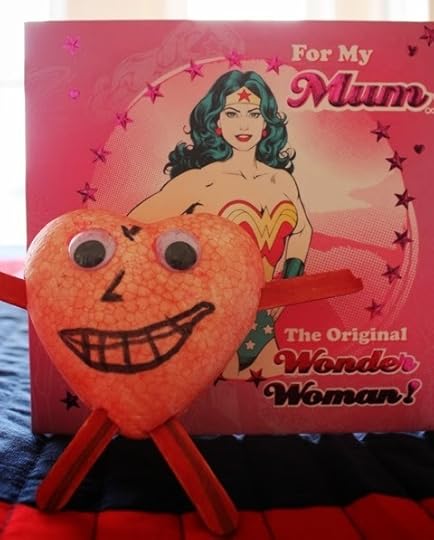 Mother's Day heart by Finn & card from Juno - I'm still waiting for Cú's contribution!To all my mother-writer pals, have a lovely day!
Mother's Day heart by Finn & card from Juno - I'm still waiting for Cú's contribution!To all my mother-writer pals, have a lovely day!My publisher New Island Books interviewed me in honour of the day, in the New Island Gazette . I am copying the full interview to here, but you may like to peruse the gazette's back issues for info on other New Island writers, including Máire T. Robinson who has just signed up with them for her début novel.
Q&A with Nuala Ní Chonchúir
The author of You, Mother America & the upcoming The Closet of Savage Mementos on writing, reading & motherhood.
Could you describe your writing process?
I have three hours a day to write (when the kids are out) so I get to my desk at 9am and prioritise what is most pressing. Usually that is whatever fiction I am working on (novel or story). I re-read and edit yesterday’s writing then try to move along. I don’t always write novels in a linear way, so I’ll write forward or back in the story. As long as I write something, I’m happy.
Once I have done a bit of actual writing, I let myself do other stuff: reviews, my mentoring (I mentor BA in Writing students), interviews, my literary blog, etc.
What advice would you offer to new writers?
Find your own rhythm (morning or night, pen or laptop). Don’t care about what anyone else is doing. Write as often as you can, even if you don’t feel like it. Learn to edit well. Read like a maniac.
What is the last book you read?
The last novel I finished (I abandon books that are not doing it for me) was Jo Baker’s Longbourn. I loved it – well written, gripping, imaginative.
Any thoughts on #ReadWomen2014?
I love the whole concept. The VIDA statistics clearly show that women are under-represented in terms of review coverage, etc. This is just what we need – a big shiny spotlight on women writers, for a change.
Why do you think fewer people read female authors?
Books are packaged to appeal to certain markets. Women’s books often have women on the covers and that, apparently, puts men off. Unisex/less gendered covers might fix some of the bias. Also, there’s a boy’s club – the men look after the men for reviews, prizes, etc. That’s why I, mostly, promote women on my lit blog – I like supporting other women writers. They need it.
Who are some of your favourite authors?
Valerie Trueblood, Éilís Ní Dhuibhne, Rachel Trezise, Edith Pearlman, Tania Hershman, Anthony Doerr, Wells Tower, Anne Enright, Mary Morrissy, David Seadaris, Colum McCann, Alessandro Baricco, Alistair MacLeod, Hemingway, Austen, the Brontës, Nam Le. A thousand others.
Is there any book that you return to time and time
again?
Jane Eyre and Pride and Prejudice. Silk by Alessandro Baricco. Lyrical language, love and humanity in all three.
You write across a range of genres: novels, short story collections and poetry. What are the different difficulties that arise when writing each?
Oh God, my least favourite question. Because it’s hard to answer. Each genre has a different feel, a different settling-in period, a different emotional hit, for both writer and reader. The novel is comforting because you have somewhere to come back to each day. The story is exciting because you are always starting afresh. Poems are shots in the arm, and they can make a writer very happy when they turn up. I write flash too (very short stories), and they combine the best of poetry and story-making – they’re like little bursts of glory when they turn out right. A good flash will make my day.
And what difficulties come with switching between genres? Which is your favourite?
When I am writing a novel, I don’t have the headspace or time for other stuff, though I often write the odd flash, and that may grow out of the research for the novel. It’s a time issue really. It can be a relief at the end of a novel to get back to stories, to start thinking short again. Fiction is my home – long and short. I love both novels and stories.
You left Ireland the day after your graduation and emigrated to Scotland for a time. What advice would you give to anyone emigrating today?
I didn’t really feel like I was emigrating – it wasn’t all curlews at dawn and weeping parents. I had done four years in Trinity College and I was sick of Dublin. I wanted a change of scene.
Advice to emigrants? Work hard, save a shitload of money and come back to where you belong, if you can manage it. When you have kids, it is nice to be around family. They start to mean more to you than they may have done before.
Motherhood is a theme found throughout many of your books. With Mothers' Day on Sunday (30th March), any thoughts on motherhood to share?
It’s the most stressful role you’ll ever have, but also the most beautiful. All your kids want is your time – give them as much of it as you can. Travel with them to new and exciting places – they will appreciate that when they are older. Read to them. And be kind to your own mother – she loves you in spite of everything, and is probably doing as near to her best as she can manage.
Lastly, where do you write?
I have a desk in my bedroom. It’s not ideal but it’s bright there. I would like to have a study again but we have run out of rooms. (The kids sucked up all the rooms…)
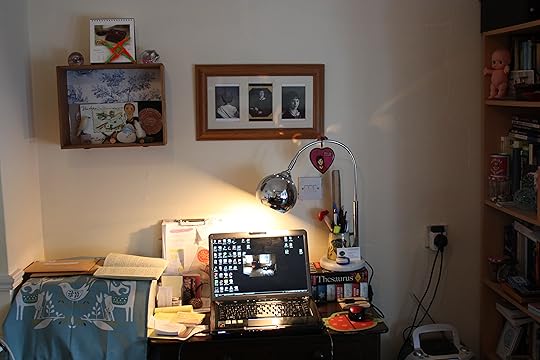 The Closet of Savage Mementos
is coming in April!
The Closet of Savage Mementos
is coming in April!
Published on March 30, 2014 04:22
March 25, 2014
STINGING FLY SPRING ISSUE LAUNCH
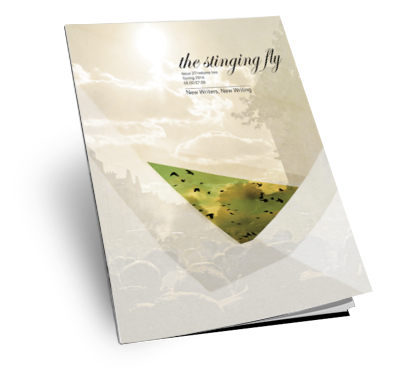 Thursday night at 7pm in the IWC sees the launch of the spring issue of
The Stinging Fly
, for which I picked the fiction. Readings, refreshments and fun.
Thursday night at 7pm in the IWC sees the launch of the spring issue of
The Stinging Fly
, for which I picked the fiction. Readings, refreshments and fun.I am taking a break from my editing marathon to go to this and also to a potentially very interesting meeting...sorry to be all cloak and dagger but, sure, isn't it all the rage?
Published on March 25, 2014 08:43
Nuala Ní Chonchúir's Blog
- Nuala Ní Chonchúir's profile
- 41 followers
Nuala Ní Chonchúir isn't a Goodreads Author
(yet),
but they
do have a blog,
so here are some recent posts imported from
their feed.


